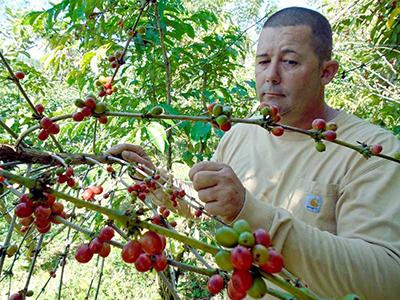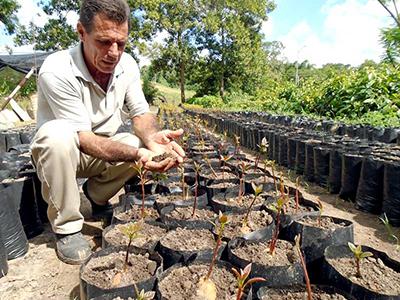
Since he decided, seven years ago, to undertake the creation of a nursery for fruit trees and ornamental plants, Jorge Luis Prats has done so with the goal of avoiding conventional thinking, to promote a type of agriculture focused on “what nature provides.”
“The intention is to debunk the myth that we need to do everything with chemicals, and demonstrate that, without them, food can be produced.”
With sustainability in mind, the first steps were taken to transform what had become a garbage dump located on the shores of the Guamá River, outside of the provincial capital of Pinar del Río, into a valuable project which now provides 120 varieties of seedlings.
Prats reports, “Take avocado, for example, we now have the complete range, to be able to harvest all year. This is something that can already be noted in production, on the basis of plants we have contributed.”
They have additionally developed fish farming, raised small livestock, and begun to plant fruit orchards.
“All of this coming up against a lot of people who said that it could not be accomplished, because the topography of the terrain is not the most appropriate, but we have constructed terraces and, on them, raised beds.”
Like Jorge Luis Prats, many other small farmers have joined the agro-ecological movement in Pinar del Río.
Noelia Víctores, the program’s provincial coordinator, reports that there are now more than 5,800 producers affiliated with the initiative, working with a variety of techniques including soil conservation with the incorporation of organic material and creation of living barriers to prevent erosion; the production of natural fertilizers with earthworm humus; using biological means to control pests; and the development of renewable energy sources, among others.

“There are some who use up to 12 different practices,” she explained. According to the specialist, this all began in 1997, with the scarcity of inputs produced by the collapse of the USSR, and also because of the pressing need to care for soils.
“Farmers who traditionally used these types of techniques were identified, and they joined the movement,” Víctores explained, and via workshops and training, the ranks continued to grow over the years.
“It is not only a question of resources, but to have healthier food, as well,” she said.
This is what Daniel García believes, too. After more than 12 years as part of the agro-ecological movement, he insists that the results are impressive, explaining, “What was here as plant growth was absolutely nothing. We have created the soil ourselves.”
First applying what he had learned on his own, and later knowledge acquired in courses and training events, Daniel has been able to take great advantage of land which has always been rocky and uneven. He now has 36 types of fruit trees, 240 coffee shrubs, and cultivates beans, tomato, lettuce and cabbage.
What’s more, he has taken on raising pigs, using a bio digester to covert excrement into biogas; earthworm propagation; and fish farming in a pond which also provides water to the irrigation system. To complete the productive cycle, he has created a mini processing plant and supplies a 24-hour juice bar at the provincial hospital.
“This farm is located on a hill, and every time it rained, the rushing water didn’t leave a thing. So we set about placing living and non-living barriers, which prevented erosion. At the same time, we planted canutillo, a type of ground cover that creates a kind of mat on the soil, and when we go to sow something, we just make a little hole for the seedling.”
Given its excellent results, the farm was chosen as a demonstration site for agronomy students at Pinar del Río’s Hermanos Saíz University. Farmers who are members of the local José María Pérez cooperative, and others from around the province have trained here.
“The use of agro-ecology has allowed us to achieve good yields, without harming the environment. And additionally gives us the ability to generate everything we need for our plantings.
“Previously, we had to go to the cooperative and ask for fertilizer, and other inputs, which are expensive, and, many times, unavailable.
“On the other hand, now we can guarantee all of this here ourselves, with biological means to control pests and organic material.”
Despite the merits, the number of people who continue waiting for shiploads of pesticides and fertilizer is still high.
Noelia notes that, despite the almost 6,000 campesinos participating in ecological initiatives around the province, the potential in Pinar del Río is five times greater. Thus the necessity of continuing to attract forces to a movement which is growing worldwide, as people become aware of the damage caused by chemicals to the environment and human health.















